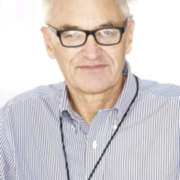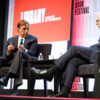Michael Dobbs (2) (1950–)
Author of One Minute to Midnight: Kennedy, Khrushchev, and Castro on the Brink of Nuclear War
About the Author
Born in 1948 Michael Dobb was Chief of Staff and later Deputy Chairman of the Conservative Party. He has a doctorate in nuclear defense studies. Dobbs has also been Deputy Chairman of Saatchi & Saatchi, he presented the BBC TV current affairs program Despatch Box and was a columnist for The Mail on show more Sunday. Dobbs recently penned the hugely acclaimed theatre play, 'The Turning Point'. He is also the author of the Harry Jones Thrillers, Churchill Novels, and the Parliamentary Novels Series. The immensely popular Netflix series House of Cards is based on book 1 of the Parliamentary Novels by the same name. Michael became Lord Dobbs of Wylye in December 2010 after a long career in and around politics. (Bowker Author Biography) show less
Image credit: Journalist Michael Dobbs at the 2019 Texas Book Festival in Austin, Texas, United States. By Larry D. Moore, CC BY-SA 4.0, https://commons.wikimedia.org/w/index.php?curid=84377173
Series
Works by Michael Dobbs
One Minute to Midnight: Kennedy, Khrushchev, and Castro on the Brink of Nuclear War (2008) 811 copies, 17 reviews
Six Months in 1945: FDR, Stalin, Churchill, and Truman--from World War to Cold War (2012) 215 copies, 5 reviews
Associated Works
Tagged
Common Knowledge
- Legal name
- Dobbs, Michael Sean
- Birthdate
- 1950-07-27
- Gender
- male
- Birthplace
- Belfast, Northern Ireland, UK
- Education
- University of York (BA in Economic & Social History, 1972)
- Occupations
- journalist
visiting professor - Relationships
- Dobbs, Michael (MD-1 is distant cousin)
- Organizations
- Washington Post (Eastern European Correspondent)
University of Michigan (Department of Communications Studies|visiting professor)
Members
Reviews
Lists
Awards
You May Also Like
Associated Authors
Statistics
- Works
- 9
- Also by
- 1
- Members
- 1,617
- Popularity
- #15,936
- Rating
- 4.1
- Reviews
- 47
- ISBNs
- 345
- Languages
- 18




















Michael Dobbs, author of "The Unwanted," obtained a wealth of information from interviews, oral histories, diaries, memoirs, newspaper articles, photographs, and speeches. He links the experiences of Kippenheim's inhabitants to the mood in Europe and America during the thirties and forties. We witness the agony and fear of desperate Jews waiting in long lines outside the U. S. consulate, hoping to acquire the necessary documents to book passage to America. Meanwhile, quite a few elected officials and their constituents in Washington, D. C. and elsewhere were isolationists and/or bigots. A few influential figures pushed to ease America's restrictive immigration quotas, but the majority of Americans were adamantly against allowing Jewish refugees to enter the United States. Mrs. Roosevelt urged FDR, at the very least, to authorize a rescue program for children, but President Roosevelt feared that if he granted her wish, he would pay a steep political price.
In this lucid and enlightening work of non-fiction, Dobbs provides an intimate, detailed, and infuriating look at man's inhumanity to man, and he demonstrates what can happen when a dictator sets in motion a "Final Solution" for eliminating "undesirables." Sadly, although newspapers published articles outlining the atrocities that were occurring in Europe, this knowledge did not lead to widespread efforts to assist the "huddled masses yearning to breathe free." "The Unwanted" is a wrenching work of non-fiction that is enhanced by its evocative photographs, superb introductory essays, and powerful epilogue.… (more)